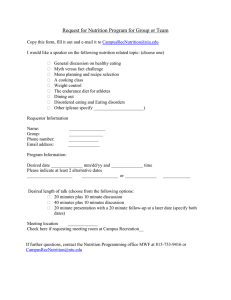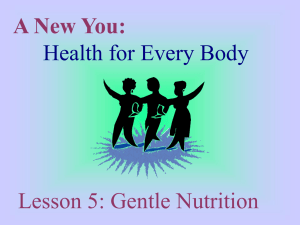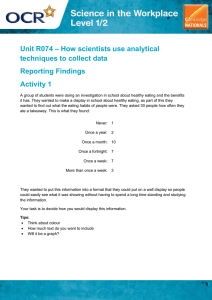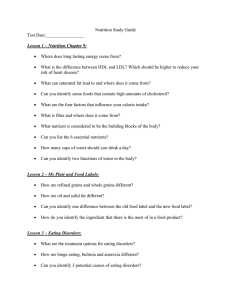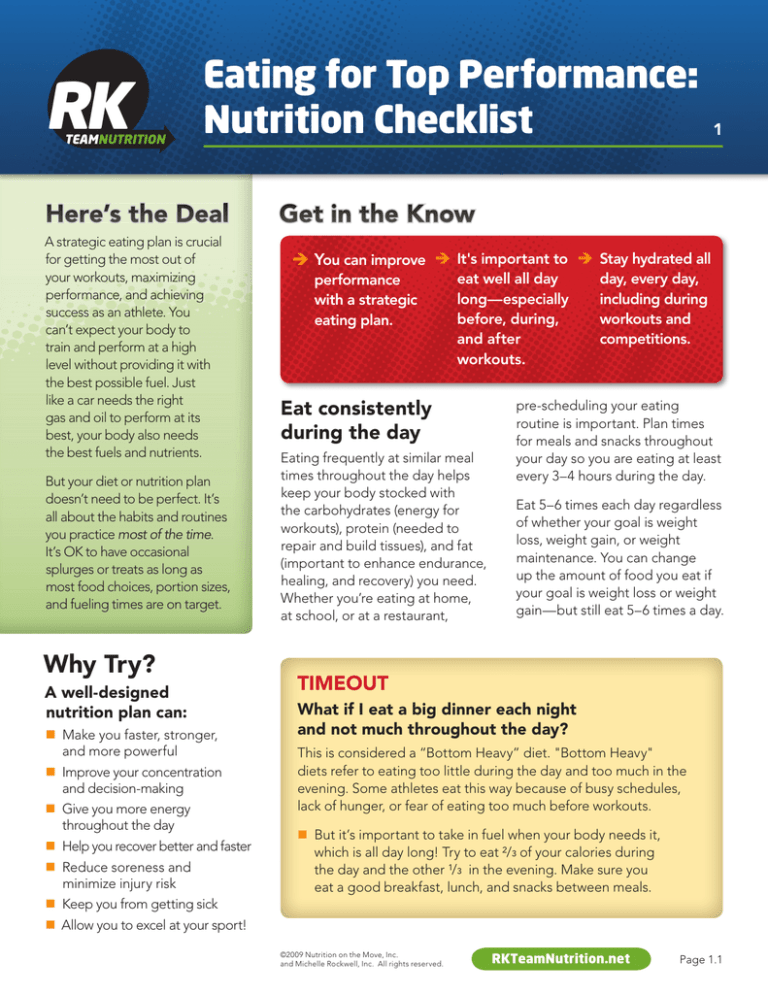
RK
TEAMNUTRITION
Eating for Top Performance:
Nutrition Checklist
Here’s the Deal
A strategic eating plan is crucial
for getting the most out of
your workouts, maximizing
performance, and achieving
success as an athlete. You
can’t expect your body to
train and perform at a high
level without providing it with
the best possible fuel. Just
like a car needs the right
gas and oil to perform at its
best, your body also needs
the best fuels and nutrients.
But your diet or nutrition plan
doesn’t need to be perfect. It’s
all about the habits and routines
you practice most of the time.
It’s OK to have occasional
splurges or treats as long as
most food choices, portion sizes,
and fueling times are on target.
Why Try?
A well-designed
nutrition plan can:
Make you faster, stronger,
and more powerful
Improve your concentration
and decision-making
Give you more energy
throughout the day
Help you recover better and faster
Reduce soreness and
minimize injury risk
1
Get in the Know
You can improve It's important to Stay hydrated all
performance
with a strategic
eating plan.
eat well all day
long—especially
before, during,
and after
workouts.
Eat consistently
during the day
Eating frequently at similar meal
times throughout the day helps
keep your body stocked with
the carbohydrates (energy for
workouts), protein (needed to
repair and build tissues), and fat
(important to enhance endurance,
healing, and recovery) you need.
Whether you’re eating at home,
at school, or at a restaurant,
day, every day,
including during
workouts and
competitions.
pre-scheduling your eating
routine is important. Plan times
for meals and snacks throughout
your day so you are eating at least
every 3–4 hours during the day.
Eat 5–6 times each day regardless
of whether your goal is weight
loss, weight gain, or weight
maintenance. You can change
up the amount of food you eat if
your goal is weight loss or weight
gain—but still eat 5–6 times a day.
TIMEOUT
What if I eat a big dinner each night
and not much throughout the day?
This is considered a “Bottom Heavy” diet. "Bottom Heavy"
diets refer to eating too little during the day and too much in the
evening. Some athletes eat this way because of busy schedules,
lack of hunger, or fear of eating too much before workouts.
But it’s important to take in fuel when your body needs it,
which is all day long! Try to eat ²/³ of your calories during
the day and the other ¹/³ in the evening. Make sure you
eat a good breakfast, lunch, and snacks between meals.
Keep you from getting sick
Allow you to excel at your sport!
©2009 Nutrition on the Move, Inc.
and Michelle Rockwell, Inc. All rights reserved.
RKTeamNutrition.net
Page 1.1
Develop a solid
eating routine
You need to be aware of what you
eat, especially before and after
workouts. Athletes should eat a
meal or snack 1–3 hours before
every workout and a recovery
meal or snack within 30 minutes of
completing hard or long workouts.
Consistently eating a smart
breakfast is also key to athletic
success. Consider this: When
you get up in the morning, your
body hasn’t been fueled for a
long time, possibly as long as 10
hours! Eating as soon as possible
after you wake up helps your body
get the fuel it needs to jump-start
your engine. This will help you
think more clearly, keep your
metabolism high, and help your
body use energy more efficiently.
Bottom Line
Eating quality foods with
a well-designed nutrition
plan can improve
athletic performance.
Your body needs to
be fueled often and
consistently. Have 5–6
meals and snacks per
day, eating at least
every 3–4 hours.
Your body needs the
best fuel most of the time
to train at a high level.
Eat a smart breakfast
as soon as you wake
up each day to
jump-start your day.
Stay hydrated!
Performance Nutrition Assessment
Nutrition Goals
Always
Most of
the Time
Not
Enough
DO I?
Eat breakfast as soon as possible after I wake up
Start drinking water or other fluids when I wake
up to pre-hydrate for the day’s workouts
Plan meals and snacks so I eat every 3–4 hours
during the day to properly fuel my body
Balance my plate at meals with ¹/³ protein
(meat, fish, beans, cottage cheese, peanut
butter) and ²/³ carbohydrates (grains and
cereals, bread, pasta, rice, fruits, veggies)
Eat 1-3 hours before practice to fuel my muscles
ahead of time (mostly high-carbohydrate
foods; no fried foods before workouts)
Include “good fats” in my diet that may help
with recovery, including nuts, seeds, soy nuts,
peanut butter, olive oil, and oil-based dressings
Maximize recovery nutrition after intense
workouts by eating or drinking recovery
fuel (fluids, carbs, & protein) within 30
minutes of completing exercise
Eat at least 2 pieces or cups of fruit and 2 cups
of vegetables a day to boost natural nutrients
Eat or drink at least 3 high-calcium sources
a day (a glass of milk, a cup of yogurt, a slice
of cheese, a glass of calcium-fortified juice)
Drink fluids all day long + at least 6 ounces
for every 20 minutes during hard workouts
Bring snacks with me during the day
so I can stay fueled with energy
Take a multivitamin daily
Recognize that my nutritional needs
are different than friends and family
members who are not athletes
Prioritize sleep (at least 7–8 hours a night)
so my body has a chance to recover
and repair on a consistent basis
Consider my diet as a key part of my training
regimen to help reach my athletic potential
This handout was designed by Sports Dietitians Michelle Rockwell, MS, RD, CSSD and Susan Kundrat, MS, RD, CSSD
to provide general education. For specific concerns, refer to your sports medicine team.
©2009 Nutrition on the Move, Inc.
and Michelle Rockwell, Inc. All rights reserved.
RKTeamNutrition.net
Page 1.2

